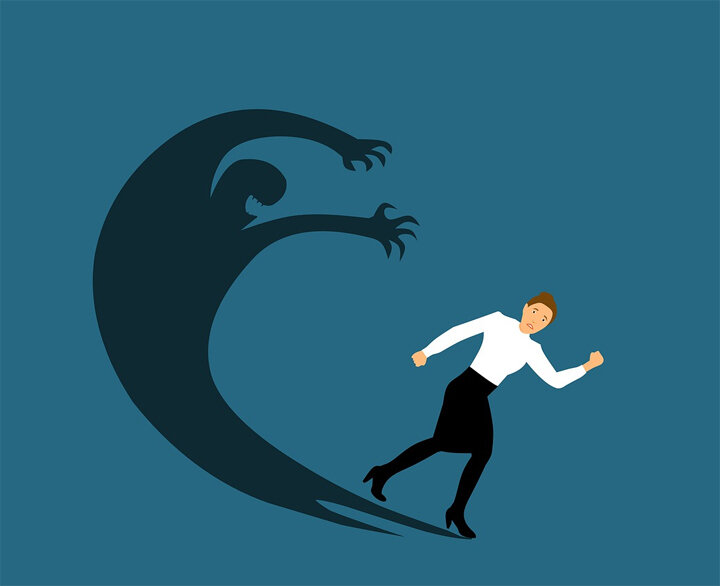Phobia Counselling

LET’S KNOW ABOUT PHOBIA
We should know about “Phobia” before labelling mind-sets, which indicates lack of knowledge. Phobia is a type of anxiety disorder that involves an intense and persistent fear of a specific object, situation, or activity. The fear is often out of proportion to the actual threat posed by the object or situation, and it can interfere with daily activities and quality of life. Some common phobias include:
1. Agoraphobia: fear of open spaces or being in crowded public places.
2. Arachnophobia: fear of spiders.
3. Acrophobia: fear of heights.
4. Claustrophobia: fear of confined spaces.
5. Social phobia: fear of social situations or being evaluated by others.
6. Specific phobias: intense fear of specific objects or situations, such as dogs, flying, or injections.
Phobias can be treated effectively with a combination of therapy, such as cognitive-behavioral therapy (CBT), Meditation & Mindfulness based Therapies and medication management. A mental health professional can help you develop a treatment plan that meets your unique needs and goals, and provide you with the support and tools you need to overcome your phobia and improve your quality of life.
THE SYMPTOMS OF A PHOBIA
The symptoms of a phobia can vary from person to person, but common signs and symptoms include:
- Intense fear: A phobia can cause an intense and overwhelming fear of a specific object, situation, or activity.
- Physical symptoms: Some people with phobias may experience physical symptoms such as sweating, shaking, rapid heartbeat, or chest
- Avoidance: People with phobias often try to avoid the objects or situations they fear, which can limit their ability to participate in daily activities and enjoy
- Anxiety: Phobias can cause significant anxiety and worry, even when the feared object or situation is not
- Interference: Phobias can interfere with daily activities, such as work, school, or
- Intrusive thoughts: Some people with phobias may experience intrusive thoughts or images related to their fear, which can increase anxiety and worry.
If you are experiencing symptoms of a phobia, it’s important to seek help from a mental health professional. They can help you determine the underlying cause of your phobia and develop a treatment plan to help you manage your symptoms and improve your quality of life.
TYPES OF PHOBIA
There are many different types of phobias, including:
- Agoraphobia: fear of open spaces or being in crowded public
- Arachnophobia: fear of
- Acrophobia: fear of
- Claustrophobia: fear of confined
- Social phobia: fear of social situations or being evaluated by
- Specific phobias: intense fear of specific objects or situations, such as dogs, flying, or
- Blood-Injection-Injury phobia: fear of injury, blood, or
- Zoophobia: fear of animals, such as snakes or
- Aerophobia: fear of
- Dentophobia: fear of going to the
- Emetophobia: fear of
- Hydrophobia: fear of
- Nosophobia: fear of becoming
- Trypanophobia: fear of needles or
It’s important to note that phobias can also be classified into broader categories, such as animal phobias, natural environment phobias, situational phobias, and medical phobias. A mental health professional can help you determine the specific type of phobia you may have and develop a treatment plan to help you manage your symptoms and improve your quality of life.
CAUSES OF PHOBIA: what is the source of Phobia..?
The exact cause of phobias is not fully understood, but it is thought to be a combination of genetic, environmental, and psychological factors. Some of the potential causes of phobias include:
- Genetics: A family history of anxiety disorders or phobias may increase the risk of developing a phobia.
- Trauma: A traumatic event, such as a physical injury or a stressful experience, can trigger the development of a
- Brain chemistry: Imbalances in brain chemicals, such as neurotransmitters, may contribute to the development of phobias.
- Learning: Phobias can be learned through observation, modeling, or direct For example, a child who sees a parent or sibling react with fear to a specific object or situation may develop a phobia themselves.
- Cognitive factors: Negative thoughts, beliefs, and attitudes about specific objects or situations may contribute to the development of phobias.
- Environmental factors: Exposure to specific objects or situations that are associated with fear or danger may trigger the development of a
OVERCOMING PHOBIA WITH ONLINE/OFFILINE COUNSELING
It’s important to remember that phobias are complex conditions that can develop for many reasons, and it’s often a combination of factors that contribute to their development. If you are experiencing symptoms of a phobia, it’s important to seek help from a mental health professional, who can help you determine the underlying cause of your phobia and develop a treatment plan to help you manage your symptoms and improve your quality of life.
Both online and offline counseling can be effective in helping people overcome their phobias. The specific type of counseling that may be most helpful will depend on the individual and their specific needs and preferences.
- Online Counseling: Online counseling offers the convenience and flexibility of receiving therapy from the comfort of your own home, and it can be a great option for those who live in rural or remote areas, or for those who have busy schedules. Online counseling can be conducted via video conferencing, phone, or messaging, and it may be helpful for individuals with phobias who feel anxious about going to therapy in
- Offline Counseling: Offline counseling, also known as face-to-face counseling, involves meeting with a therapist in This type of counseling may be a good option for individuals who prefer in-person interaction and who may feel more comfortable talking about their feelings and experiences in a face-to-face setting.
Regardless of the type of counseling you choose, the goal is to work with a mental health professional to develop a treatment plan that will help you overcome your phobia and improve your quality of life.
Treatment for phobias typically involves a combination of psychotherapy, such as cognitive behavioral therapy (CBT) or exposure therapy, and medication, such as antidepressants or beta- blockers. A mental health professional can help you determine the best course of treatment for your specific needs and help you manage your symptoms and overcome your phobia.
HOW ONLINE COUNSELING WORKS IN PHOBIA
Online counseling for phobias typically involves working with a mental health professional through an online platform, such as video conferencing, phone, or messaging. The goal of online counseling for phobias is to help the individual understand their fears, develop coping strategies, and gradually overcome their phobia.
Here’s a general overview of how online counseling for phobias may work:
- Initial Assessment: The first step in online counseling is to assess the individual’s specific needs and concerns. The therapist will ask questions about the person’s phobia and the symptoms they are experiencing.
- Developing a Treatment Plan: Based on the initial assessment, the therapist will develop a treatment plan to help the individual manage their phobia. This may involve a combination of psychotherapy, such as cognitive behavioral therapy (CBT) or exposure therapy, and medication, such as antidepressants or beta-
- Therapeutic Sessions: The individual will then participate in regular therapeutic sessions with the therapist, either through video conferencing, phone, or These sessions will help the individual understand their fears and develop coping strategies to manage their phobia.
- Gradual Exposure: As the individual becomes more comfortable, the therapist may gradually expose them to the object or situation that triggers their phobia, in a controlled and safe This type of exposure therapy is designed to help the individual overcome their fear and develop a more positive relationship with the object or situation.
- Continued Support: The individual will continue to receive support from the therapist as they work through their phobia and develop a stronger sense of confidence and self-esteem.
It’s important to remember that online counseling for phobias is not a one-size-fits-all approach, and the specific treatment plan will depend on the individual’s specific needs and goals. A mental health professional can help you determine the best course of treatment for your specific needs and help you overcome your phobia and improve your quality of life.
ADVANTAGES OF ONLINE COUNSELING FOR PHOBIA
Online counseling for phobias offers several advantages over traditional in-person therapy:
- Convenience: Online counseling offers the convenience of receiving therapy from the comfort of your own home, without having to travel to a therapist’s This can be particularly beneficial for those who live in rural or remote areas, or for those who have busy schedules.
- Flexibility: Online counseling is also flexible, allowing you to schedule therapy sessions at a time that works best for you, whether that’s in the evening, on weekends, or early in the morning.
- Anonymity: For some individuals with phobias, the thought of going to therapy can be overwhelming or even scary. With online counseling, you can receive therapy in a more anonymous setting, which may make it easier for you to open up and talk about your fears and
- Cost-effective: Online counseling is often more cost-effective than traditional in- person therapy, as it eliminates the need to pay for travel or transportation
- Access to Specialists: Online counseling provides access to a wider network of mental health professionals, allowing you to find a therapist who specializes in treating
It’s important to keep in mind that online counseling may not be right for everyone, and it’s always important to carefully consider the specific needs and goals before deciding if online counseling is the right choice for you. Nevertheless, for many individuals with phobias, online counseling can be an effective and accessible option for getting the help and support they need to overcome their fears and improve their quality of life.
Where/How TO FIND ONLINE COUNSELING FOR PHOBIA..?
Finding online/offline counseling for phobias is relatively straightforward and can be done in several ways:
- Search Online: Use search engines like Google to search for online counseling services that specialize in treating phobias. Look for websites that offer mental health services and check if they offer online counseling
- Ask for Recommendations: Talk to friends, family members, or a healthcare provider to see if they can recommend any reputable online counseling
- Check for Authentic Providers: If you have health insurance, check with your insurance provider to see if they cover online,/offline counseling/services.In India some of the mental disorders you may find in the
- Look for Authentic Expert Providers: When searching for online counseling services, it’s important to look for expert mental health professionals who have experience in treating phobias. Check credentials and credentials such as the therapist’s license number, education, and professional experience to ensure they are qualified to provide counseling
- Read Reviews: Read reviews and testimonials from others who have used the service to get a better sense of the quality of the counseling services and the effectiveness of the therapist.
Once you’ve found a few online/offline counseling services that you’re interested in, it’s important to reach out and have a conversation with the therapist to see if they’re a good fit for you. This will help you determine if you feel comfortable working with the therapist and if their approach to treating phobias aligns with your goals and expectations.
Think of treating Phobia rather than experiencing and feeling vulnerable.There is a ray of Hope with root cause analysis and treatment through Integrated Sciences(Psychological, Neuroscience and Spiritual Sciences etc)
